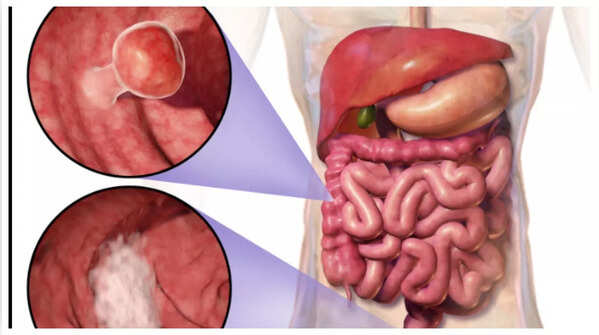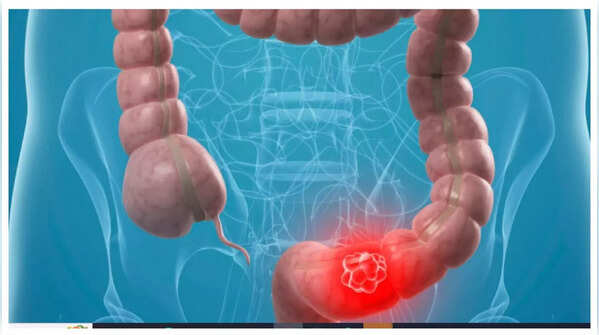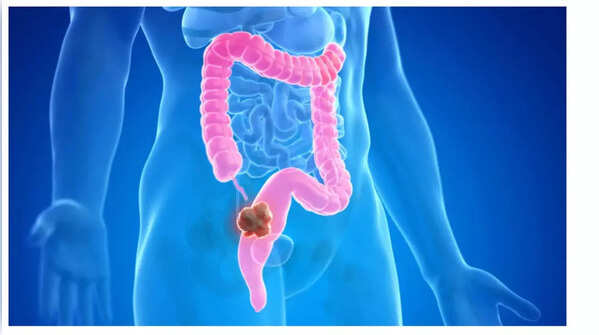Colorectal cancer, a disease affecting the colon or rectum, often develops from benign polyps that can become cancerous over time. While most cases are random, factors like family history, obesity, and lifestyle can elevate risk. Primarily affecting individuals over 50, early symptoms are often subtle, mimicking digestive issues. However, recognizing these signs is crucial. Here are five frequently missed early symptoms of colon cancer:

A key early indicator of colon cancer is a change in bowel habits, including:
These changes might appear insignificant, often attributed to diet or stress. However, persistent changes lasting more than a few days could signal a growing tumor disrupting normal bowel function.

The presence of blood in stool is a serious symptom that should never be ignored. It can manifest as:
In some cases, bleeding might be microscopic, leading to anemia over time. While other conditions like hemorrhoids can cause blood in stool, ruling out colon cancer is essential, especially with recurring incidents or accompanying symptoms.

Persistent abdominal discomfort is another often-overlooked early symptom. This can include:
Often mistaken for indigestion, continuous pain unrelated to dietary or lifestyle changes could indicate a tumor causing irritation or blockage in the colon.

Unexplained and unusual fatigue or weakness can be a subtle sign of colon cancer, particularly when combined with other symptoms. Slow, undetected bleeding in the colon can lead to iron deficiency anemia. The body's reduced red blood cell count impairs oxygen transport, resulting in fatigue, shortness of breath, and weakness. While these symptoms may be dismissed as stress-related, they warrant medical evaluation.

Unexplained weight loss is a common symptom across many cancers, including colon cancer. When the body combats cancer, the immune system is constantly activated, and tumors can affect digestion and appetite. Significant weight loss without dietary or exercise changes necessitates medical consultation. While often a later-stage symptom, it can sometimes serve as an early warning sign.
Disclaimer: This information is for educational purposes only and does not substitute professional medical advice. Always consult with a qualified healthcare provider for any health concerns.
Sources:
Newer articles
Older articles
 Evil Eye Amulet: Protective Charm or Portal to Dark Forces? A Cultural Debate
Evil Eye Amulet: Protective Charm or Portal to Dark Forces? A Cultural Debate
 Jayden Seales Fined by ICC for Provocative Gesture During Australia Test Match
Jayden Seales Fined by ICC for Provocative Gesture During Australia Test Match
 Paralympic Archer Sheetal Devi's Viral Video Shows Her Driving Car with Feet, Defying Expectations
Paralympic Archer Sheetal Devi's Viral Video Shows Her Driving Car with Feet, Defying Expectations
 Broad Slams India's Team Selection After Headingley Test Loss, Calls for Roster Tweaks at Edgbaston
Broad Slams India's Team Selection After Headingley Test Loss, Calls for Roster Tweaks at Edgbaston
 Umpire Controversy Erupts: West Indies Coach Sammy Questions Holdstock's Consistency in Barbados Test
Umpire Controversy Erupts: West Indies Coach Sammy Questions Holdstock's Consistency in Barbados Test
 Sachin Tendulkar: 1983 World Cup Win Sparked My Cricket Dream at Age 10
Sachin Tendulkar: 1983 World Cup Win Sparked My Cricket Dream at Age 10
 Jaiswal's Fielding Woes: Ex-India Star Kaif Points to Potential Cause for Dropped Catches in England Test
Jaiswal's Fielding Woes: Ex-India Star Kaif Points to Potential Cause for Dropped Catches in England Test
 Team India's England Tour: Rahul's Sleep Strategy, Coaching Rituals, and Coffee Culture Revealed
Team India's England Tour: Rahul's Sleep Strategy, Coaching Rituals, and Coffee Culture Revealed
 Suryakumar Yadav Successfully Completes Sports Hernia Surgery, Eyes Return to Cricket
Suryakumar Yadav Successfully Completes Sports Hernia Surgery, Eyes Return to Cricket
 Gujarat Cricket Set to Launch T20 League in 2025-26 Season
Gujarat Cricket Set to Launch T20 League in 2025-26 Season